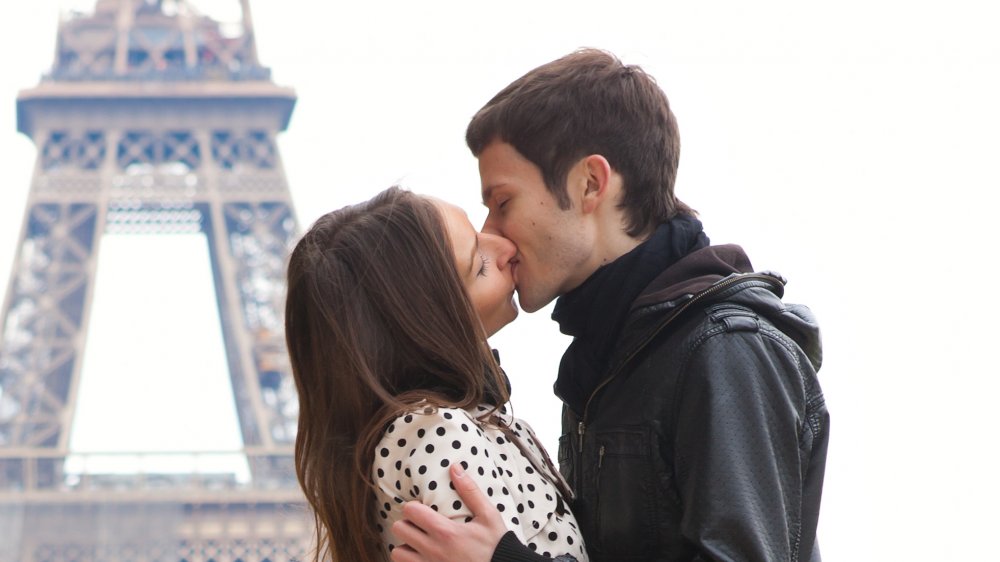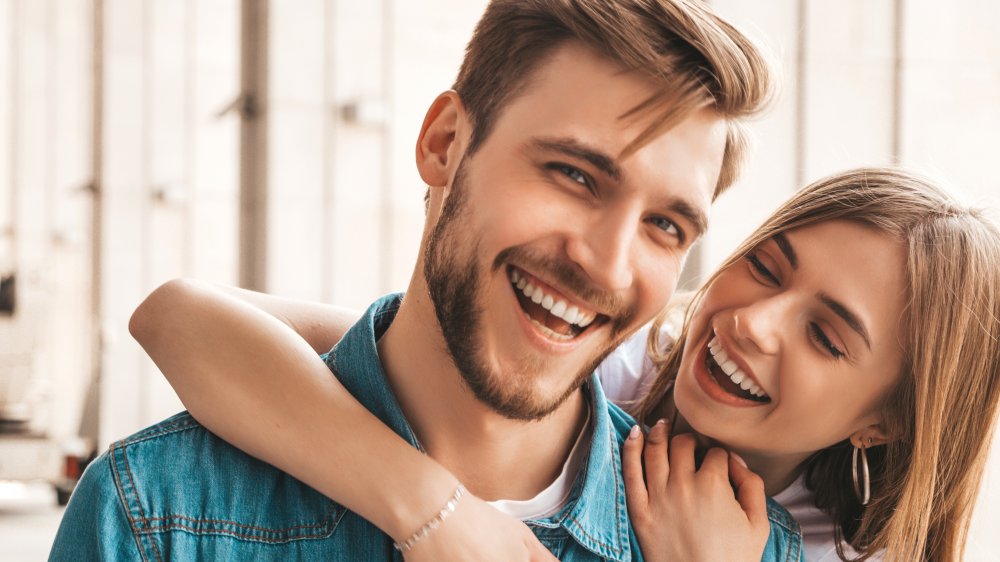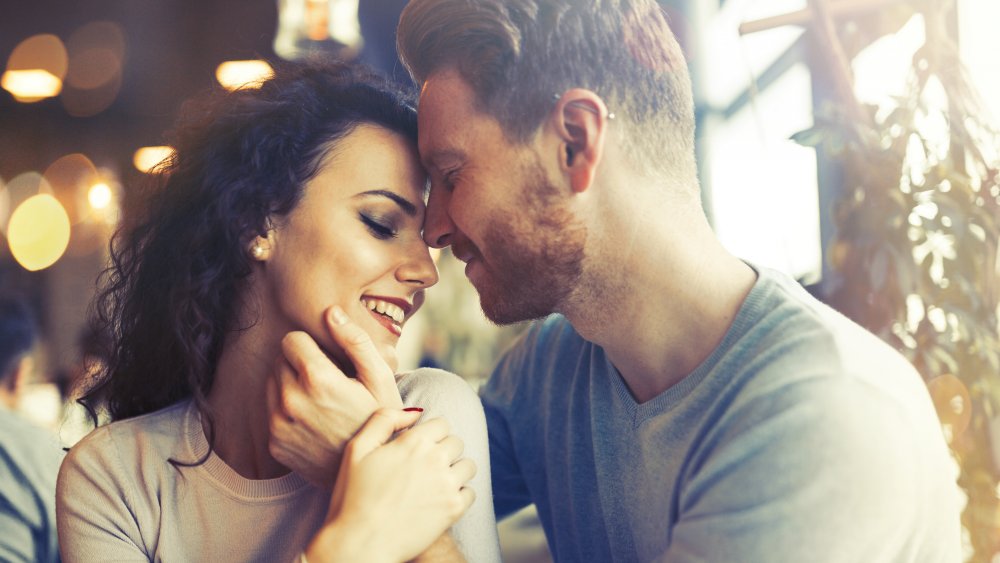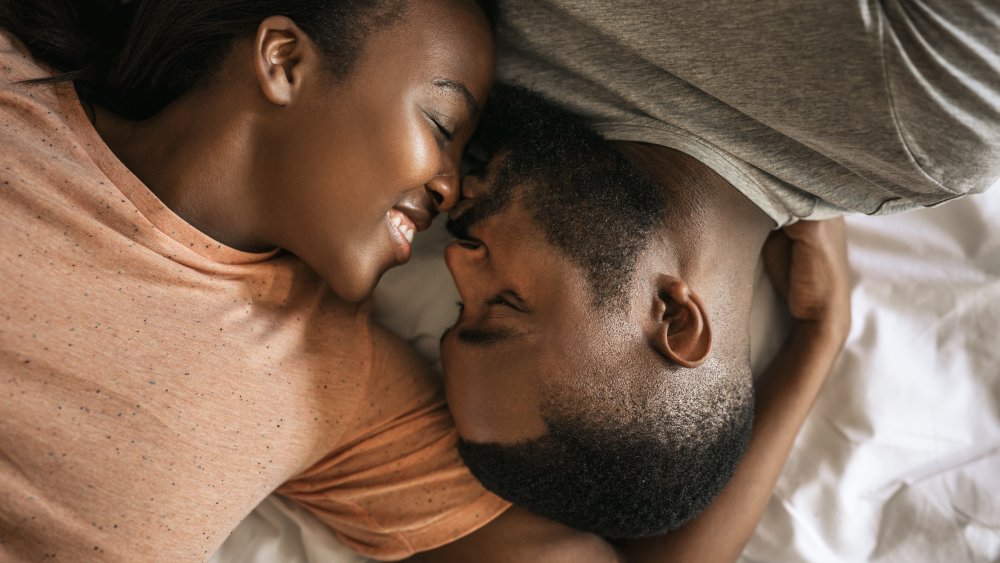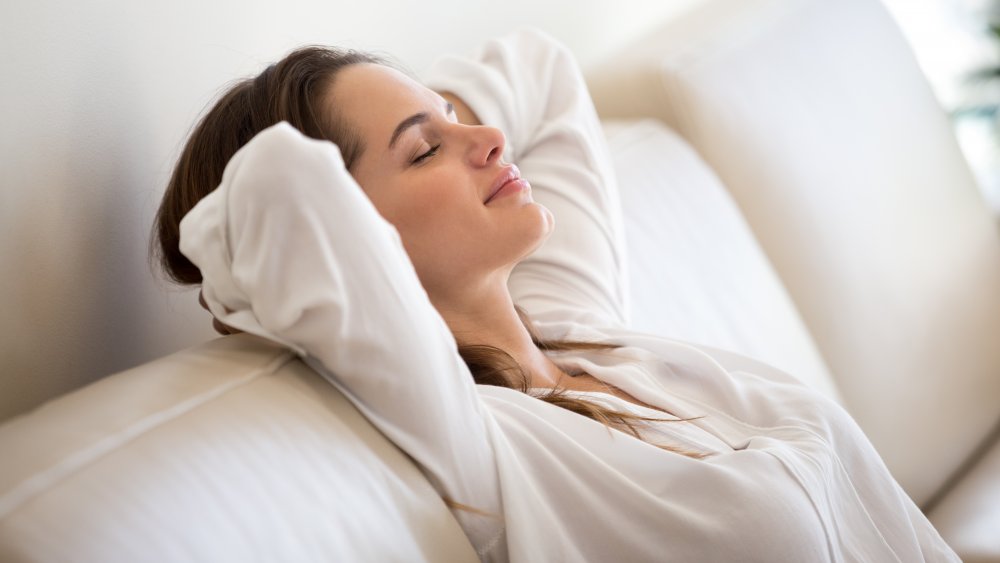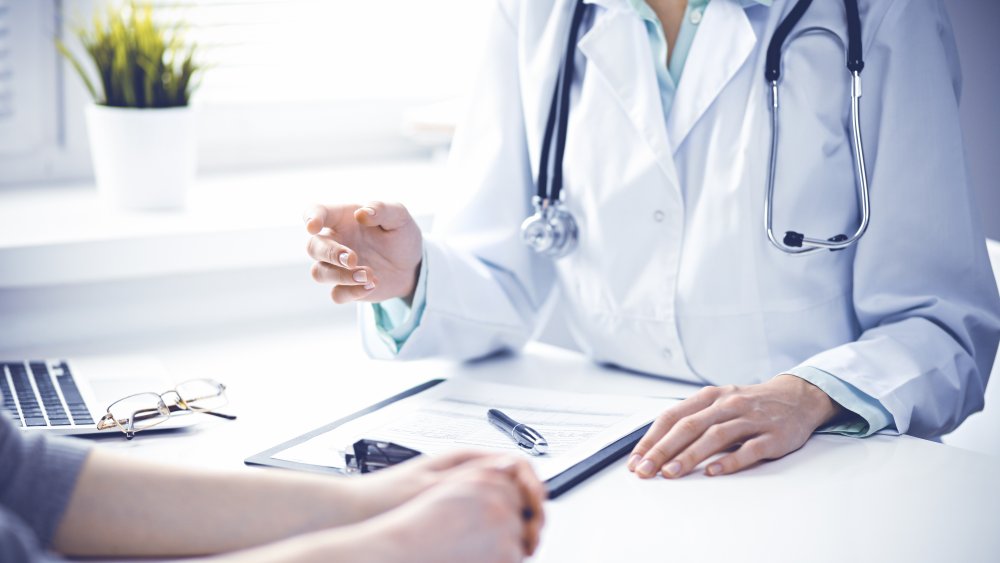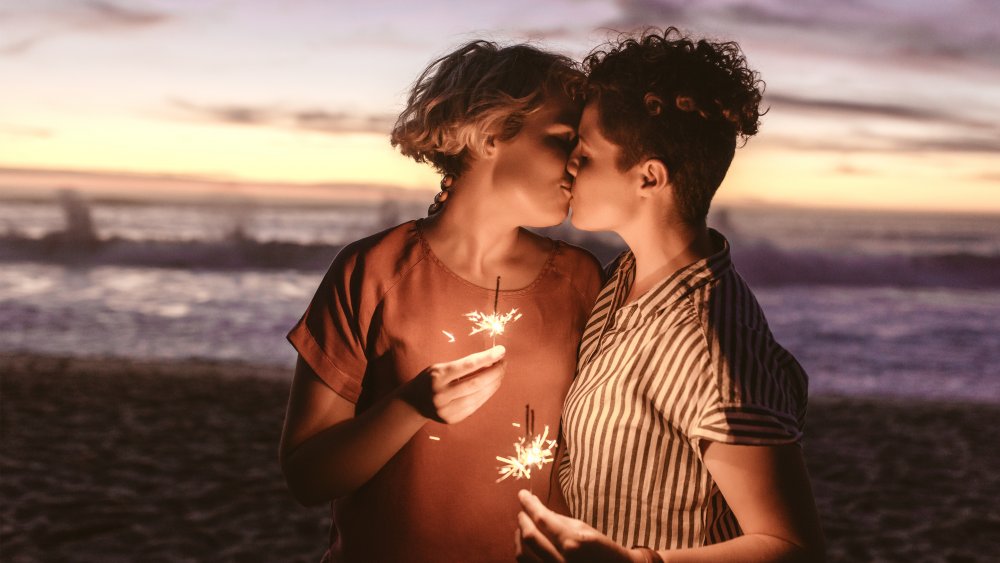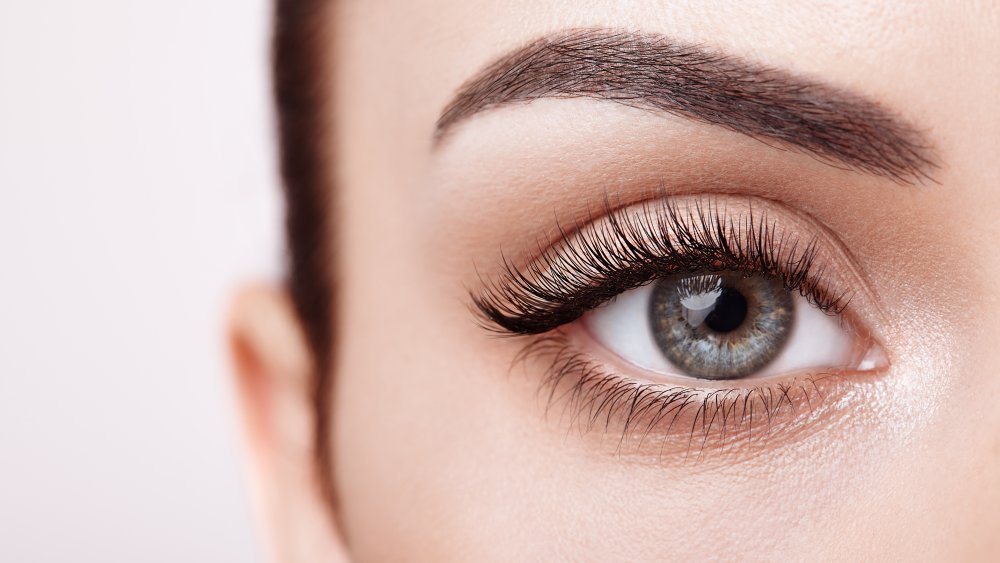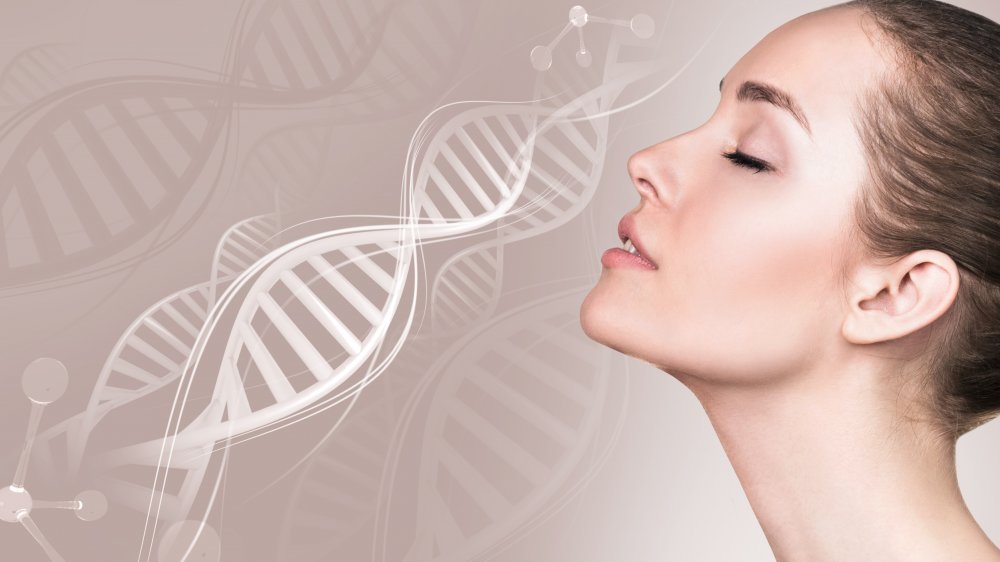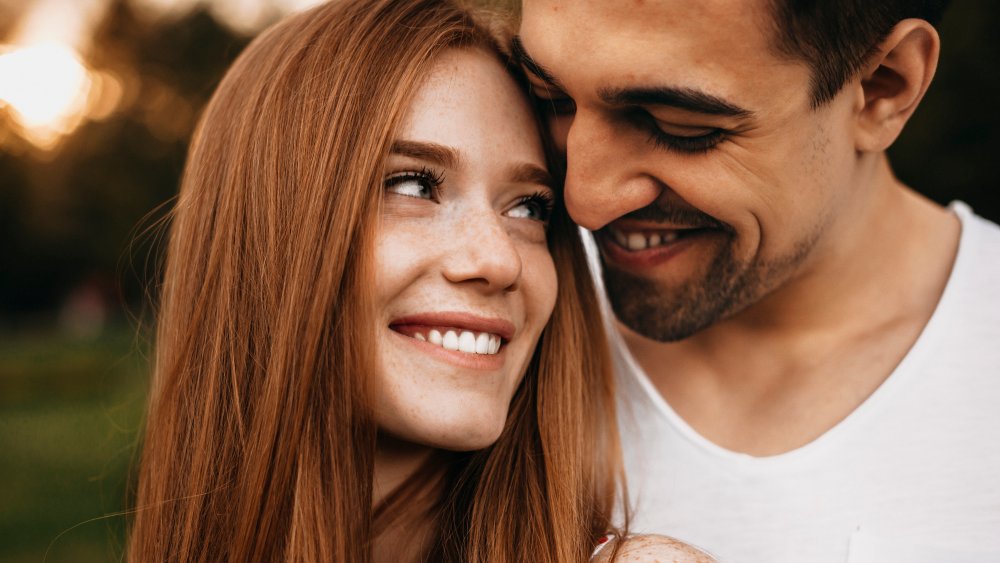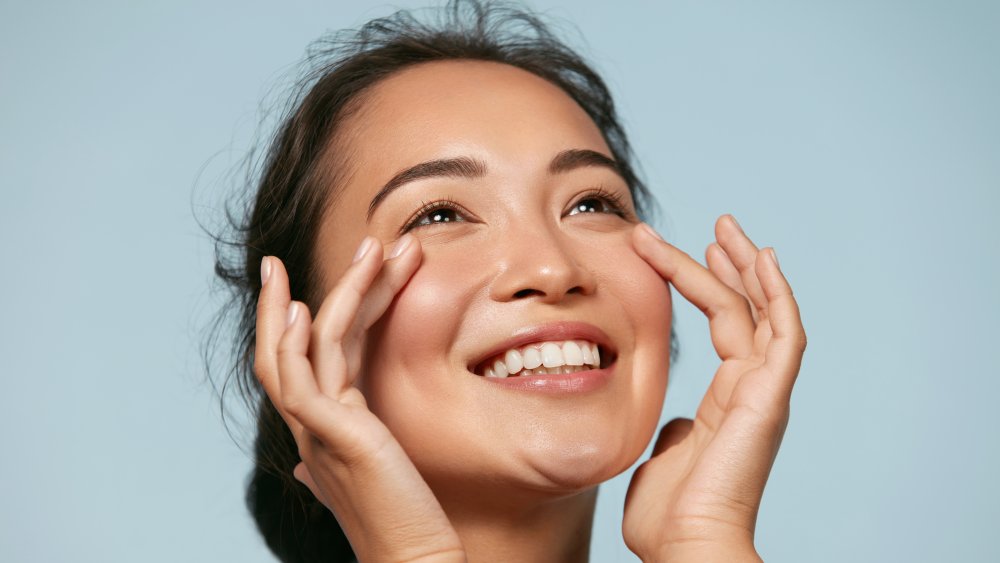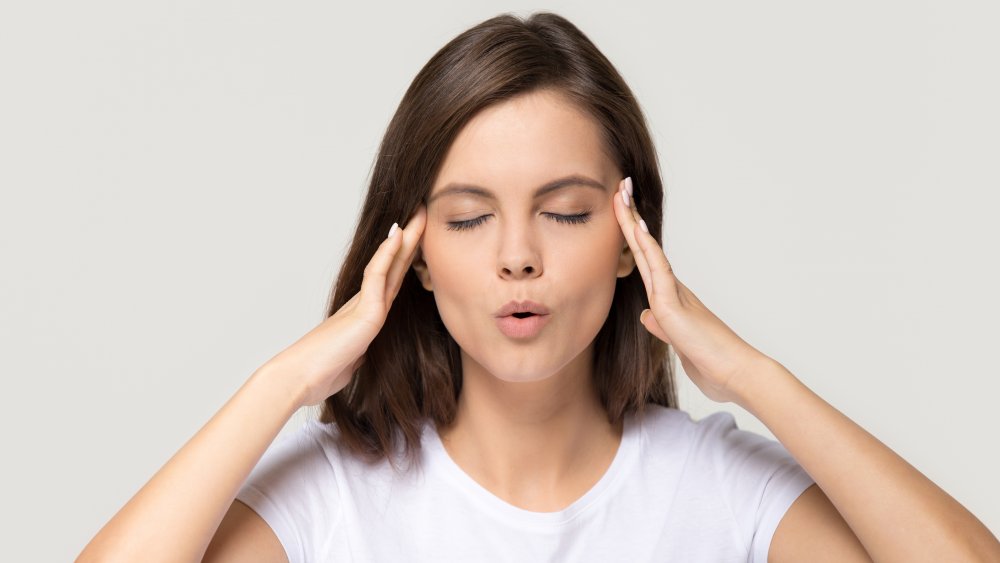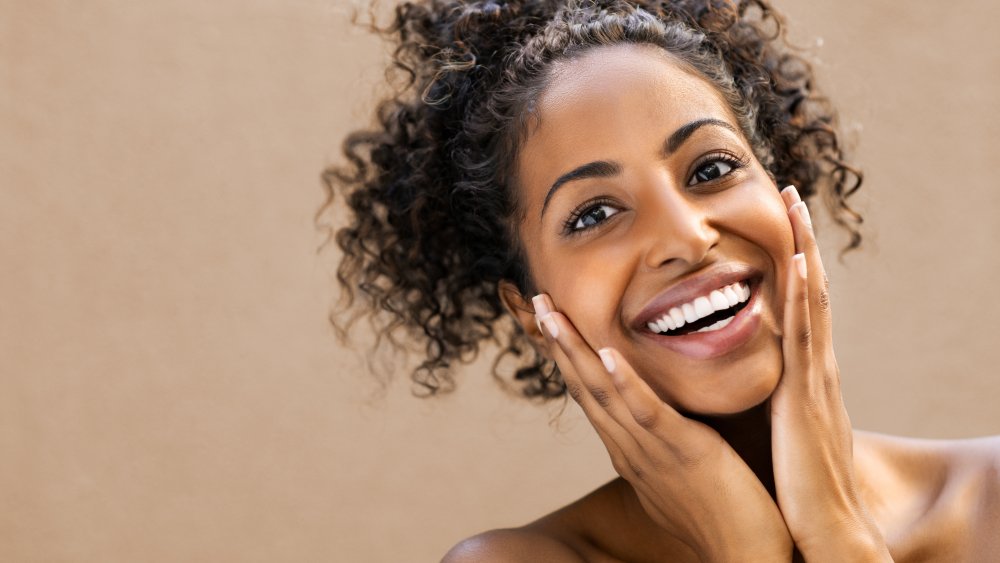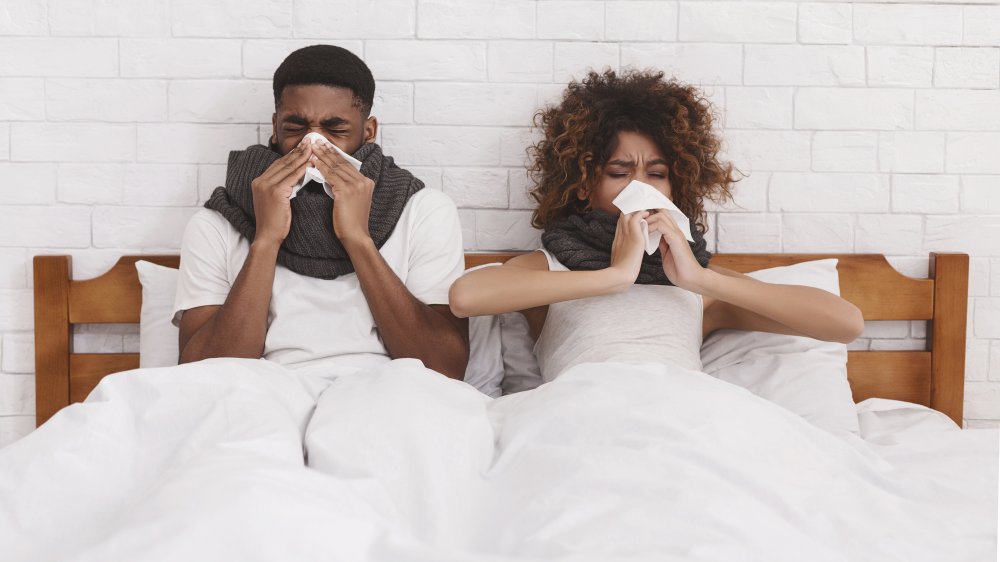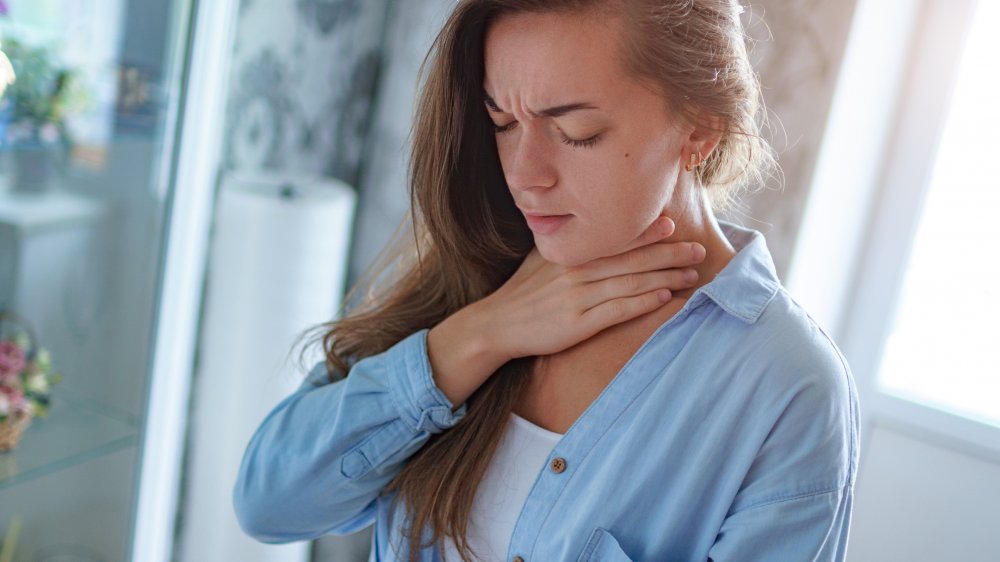When You're Kissing, What Happens To Your Body?
What happens to your body when you're kissing? Well, that depends, as not all kisses are alike; some kisses are short and sweet, while others are long and full of passion. Of course, how you kiss probably depends on who is on the receiving — or should we say reciprocating — end: a friend, a family member, a new love interest, or an established romantic partner. A peck on the lips is quite different than a hot and heavy, full-body, tongue-thrusting make-out session, after all.
Either way, kissing is a way to show affection, and maybe even initiate intimacy between you and your partner. And while it can stir up a lot of intense emotions, such as happiness, excitement, and love, kissing can also have some major physical effects on our bodies and physiology. Thankfully, most of the impacts of kissing are good and helpful.
Want to know all of the fascinating things that happen to your body when you, um, suck face with someone you know and love (or, maybe not)? Turns out there are a good deal of crazy facts about kissing you never knew.
Your body releases all sorts of happy chemicals when you kiss
If you're feeling especially content or enamored during or after a sweet smooching session with your partner, don't be fooled into thinking it's just Cupid's magic at work. In fact, there are real physiological changes that happen inside of your brain when you kiss a loved one. The sudden surge of the neurotransmitter dopamine — also known as the "feel-good neurotransmitter," according to Psychology Today — is one reason you may be smiling from ear to ear. Plus, the chemical release of seratonin and oxytocin — learn the truth about the love hormone — help to form a trifecta of "happy hormones" that could have you walking on cloud nine (via Healthline).
While this, of course, is pretty fascinating, it should come as no big surprise. Kissing feels good, after all, and when you're lip-to-lip with someone you strongly like (or maybe even love), you feel appeased and appreciated. There's good news for long-term lovers, too: a 2013 study in Archives of Sexual Behavior found that married couples that kiss more often are more well-adjusted and report being happier than those who smooch less often. So keep the kisses coming — and enjoy those chemical reactions.
When you're kissing, you may also get a surge of adrenaline
When you're making out with your sweetie, does your pulse start racing? Do you find that your breath quickens and your palms get clammy when you lock lips with your lover? If so, there's a good chance that it's due to a surge of adrenaline and noradrenaline, according to Mental Floss. Those chemicals are the fight-or-flight hormones that gets you amped up and ready to go — whatever that might mean in this particularly passionate instance. Since your blood is flowing quicker than usual, and you may feel more energized and excited in the moment.
If this is your first kiss with someone, this reaction may be compounded. Sheril Kirshenbaum, author of The Science of Kissing, told Shape that the anticipation can amp up the amount of norepinephrine in your brain. That would explain the sudden onset of nerves that you experience when you and your crush are leaning in for that long-anticipated first smooch.
It can indeed be anxiety-inducing for both of the kissing parties, but those nervous tummy butterflies and the pitter-patter beating of your heart account for half the fun, right?
Kissing may boost sexual arousal
There's a reason that kissing is referred to as first base, and initiates the beginning of foreplay. The intimacy of this mouth-to-mouth, tongue-tangling activity lays the groundwork for even more more physical closeness. For one, a man's saliva has testosterone in it, as noted by Forbes. This hormone is a big contributor in amping up a woman's level of arousal. And the longer a make-out session lasts, the more likely you are to do other, er, intimate things with your partner (via Healthline). Yes, you can go ahead and blame it on the testosterone, and not at all on your self-control, or any of the surprising items that make women more attractive to men.
Furthermore, according to a study published in Evolutionary Psychology, men (okay, male college students) will generally initiate kissing in anticipation (and the hope) that the activity will lead to sex, whereas women will more often start kissing a mate after the act of consummation is complete. This adds fuel to the popular (or should we say unpopular?) belief that men are in it for one thing only.
You may feel less stressed out and anxious after kissing
In addition to increasing the hormones in your brain, kissing can also decrease your level of cortisol, otherwise known as the stress hormone, according to Penn Medicine. Yes, kissing can make you feel euphoric, and also take the edge off if you're worried. Feeling anxious? Consider smooching someone you love, or try any of these ways to help yourself feel less anxious.
Dr. Joy Davidson, a Seattle-based psychologist and clinical sexologist, explained that kissing is a form of sensual meditation. "It stops the buzz in your mind, it quells anxiety, and it heightens the experience of being present in the moment," she revealed in a chat with WebMD. "It actually produces a lot of the physiological changes that meditation produces." And meditation's scientifically proven benefits are impressive!
In essence, you can either sit and breathe through your stress, or you can kiss your way to a more mellow mind. Dr. Bryant Stamford, a professor at the University of Louisville, recommends the latter: "The process of being active — and that can include kissing, sex, and any other whole-body activities — that's what keeps you healthy," he told WebMD.
Kissing may decrease your cholesterol
Got high cholesterol? Of course, you could consider the obvious route: eating healthier, whole foods, reducing your red meat intake, exercising with greater frequency, and maybe taking a doctor-prescribed medication, as recommended by the Mayo Clinic. Another potential option? Believe it or not: more kissing.
Yes, it turns out that affectionate canoodling and kissing can have a reductive effect on your blood lipids. A study published in the Western Journal of Communication followed 52 married adults for six weeks. Some were placed in an experimental group that was asked to kiss their partner more (it's a tough gig, but someone's got to do it), while the control group was not given any specific instructions. After the study was completed, those in the kissing group reported less stress, a factor that can contribute to higher cholesterol levels. What's even more impressive, however, is that blood tests showed that the kissing couples had improved their total serum cholesterol levels, in comparison to those in the non-smooching group.
Of course, it goes without saying that kissing isn't an actual treatment plan for folks with high cholesterol. But it certainly can't hurt, according to science!
You may burn upwards of 100 calories during a heavy kissing session
Need a little motivation to get your sexy time on? We have a weighty (hint-hint) consideration for you to ponder. Not only does kissing promote bonding, as well as reduce stress and anxiety, but it can also help you burn some major calories. Yes, you might just be able to skip a trip to the gym if you really prioritize mind over matter and, you know, put your mouth to work.
So how many calories does kissing really burn? On average, kissing can burn two to three per minute, as noted by Healthline. But a heavy duty make-out session that involves the whole body probably makes that number even higher. In fact, it's possible that a 30-minute session could even burn up to 150 calories. That's equivalent to swimming laps in a pool for 20 minutes, or walking two miles in 30 minutes, according to Harvard University.
So the next time you're deciding between hitting the treadmill or staying home, grab your partner and plant a long passionate one on their mouth. You'll both be thankful, especially if you just ate a restaurant meal with more than one day's calories.
Your pupils will dilate when you're kissing
Have you ever wondered why you close your eyes during an intense make-out session? It could be because you don't want to get too up close and personal with your partner's pores (no one looks that good under extreme magnification). Despite this unsightly prospect, it's more likely that you shut your eyes when kissing because your pupils have dilated, making you more sensitive to light, per Marie Claire.
In this intimate instance, your pupils dilate as an autonomic nervous system response to your sudden arousal and situational enjoyment. Furthermore, pupil dilation is a sign of attraction, as noted by Healthline. This is the body's subconscious way of allowing you to see something that's either exciting you — or worrying you — more clearly.
So the next time you see your crush's pupils dilate in your face-to-face presence, it might be a sign that they think you're looking mighty good.
There is a subconscious genetic analysis happening when you're kissing
When you kiss a potential partner, there's a whole lot of evaluation happening on a subconscious level. Beyond deciding if this person is a good kisser or not (fingers crossed), you're also unknowingly deciding if they'll make a good life mate — or not.
According to Live Science, kissing is an "evolutionary screening tool" to determine if you and your sweetie can compatibly have healthy children. Additionally, your saliva and breath have chemical signals embedded within them that can clue you into whether they are the right reproductive match for you.
Furthermore, the exchange of pheromones (chemicals that feature important information about one's biology, as noted by Medical News Today) further fuels this subconscious information swap. That's because people tend to be more attracted to the pheromones of individuals who have an immune system that differs from their own. Why? These potential matches have a genetic makeup that, combined with their own, would more likely result in producing healthy children. So apparently, there are many signs he's definitely not "the one."
Believe it or not, you'll give your immune system a boost by kissing a partner
It may seem counterintuitive, but kissing your partner regularly just might give your immune system a hearty, healthy boost. According to a 2014 study published in the journal Microbiome, couples share "a more similar oral microbiota composition" in their saliva and on their tongues than they do with other folks. In other words, what's mine is yours (and vice versa) — even when it comes to bacteria. Fortunately, there are plenty of good bacteria that, ultimately, regulate your body and work to keep you healthy.
One potential caveat to this research: the similar microbiota on a couple's respective tongues could also be a result of "a shared lifestyle, environment, or genetic factors from the host." So the next time your long-term partner asks for a big smooch in the midst of cold and flu season, remember that while it could expose you to some icky bacteria, it'll also give you plenty of good ones. Who knew?
Kissing can improve the tone of your facial muscles
Kissing really can be a calorie-busting, full-body commitment if you try really hard — or if you're just really into the make-out sesh. That's because you use a surprising number of muscles when kissing. But in addition to toning your bod, kissing can also give you a more localized workout: firming and strengthening the many muscles of your face. According to Healthline, you can engage 34 muscles in your face with a super passionate French kiss. Furthermore, this kind of smooching can cause a rush of blood to your lips and face, increasing the natural production of anti-aging collagen (via Peak Scientific). Who needs a dermatologist or plastic surgeon when you have a pucker-up partner at home?
Skeptical as to whether or not this can really make a difference? Or perhaps you don't have anyone to currently practice with? Fear not: according to Byrdie, skincare experts encourage trying the kiss-face repetition to tone your face: "Pout your lips like you're about to kiss someone. Smile as hard as you can with your lips still pursed. Hold for 10 seconds. Relax." And repeat! Honestly, though, it's more fun with a partner.
Kissing can help to eradicate headaches and cramps
Got the makings of a migraine — by the way, this is what really happens to your body when you get a migraine — or experiencing the telltale initial cramps of your impending period? Instead of wallowing in pity and pain, swallow some over-the-counter pain reliever, hydrate with a glass of water, and then initiate a romantic kissing romp with your partner. "Kissing is great if you have a headache or menstrual cramps," Andréa Demirjian, author of Kissing: Everything You Ever Wanted to Know about One of Life's Sweetest Pleasures told CNN. This is because your blood-vessels will dilate, resulting in a naturally pain-reducing effect.
Of course, most people don't feel remotely in the mood when they're in discomfort or pain, but mustering some motivation might be the answer — and the instantaneous cure. This is why Demirjian said the cliched, "Not tonight, dear — I have a headache" excuse should actually be replaced with, "Honey, I have a headache. Come kiss me!"
You might get more cavities from kissing
Guess what? Even cavities are contagious. "Cavities are caused by bacteria that stick to teeth and feast on food particles and produce acid that causes tooth decay," dentist Dr. Emanuel Layliev explained in an interview with Self. "Just like common cold bacteria, these bacteria travel." In other words, these microbes can go from one mouth to another. And your kissing partner doesn't have to have an active cavity to pass this particular bacteria to you — it's just luck of the draw (or, rather, the drool).
A little closed-lip kiss doesn't put your pearly whites in imminent danger. However, once things get a little more intense, your cavity-free record could potentially be tarnished. "Cavities are typically passed through mouth-to-mouth contact when there is an exchange of saliva," Dr. Layliev continued.
So what's an oral-hygiene conscientious person to do? "To be on the safe side, cleansing your mouth with an antiseptic mouth rinse after intimate contact should lessen your susceptibility," Dr. Layliev added. Kiss, rinse, and repeat.
Kissing can spread germs and cause illness
As previously mentioned, kissing a partner can be good for your immune system. Of course, on the flip side, there's a dirty truth about kissing: if you're swapping spit with someone who is sick, you could be exposing yourself to all sorts of infection-causing germs. "Mouths can serve as a transmission route for germs because there is close connection with the gastrointestinal and respiratory systems, and these are common sites of infections for germs," microbiologist Dr. Kelly Reynolds told Cosmopolitan. What's more, you could end up with a virus; two of the most common diseases spread by mouth-to-mouth contact are mononucleosis and meningitis.
Additionally, there are also microbes in saliva that can possibly cause "gonorrhea, syphilis, herpes, and HPV," per Cosmopolitan. What's more, kissing someone with an oral herpes infection can cause you to develop a cold sore — even if you don't see one on your partner's mouth. Finally, it is theoretically possible that HIV can be spread from kissing in the "off-chance that both you and an infected partner happen to have tears in your gums."
It's enough to make you rethink kissing anyone and everyone with abandon!
Kissing can cause an allergic reaction
Folks with serious food allergies — these are the signs that you may have a food allergy — need to be extra careful when kissing someone. For one, a 2013 study published in the Journal of Investigational Allergology and Clinical Immunology found that 12 percent of people who smooch a partner who has recently consumed an ingredient the former is allergic to will have a reaction. Additionally, a 2003 article in Mayo Clinic Proceedings detailed the story of a woman who had to be rushed to the hospital due to an anaphylactic response. The cause? She kissed her partner who had just consumed shrimp, which she is allergic to.
The effects of a post-peanut or shellfish kiss can be tragic, and even fatal, for those with major life-threatening food allergies. This is why it's vital to inform these individuals that they don't actually have to eat the offending ingredient in order to have an allergic reaction. Rather, just touching the food or smooching someone who's recently consumed it can also cause a severe reaction.
